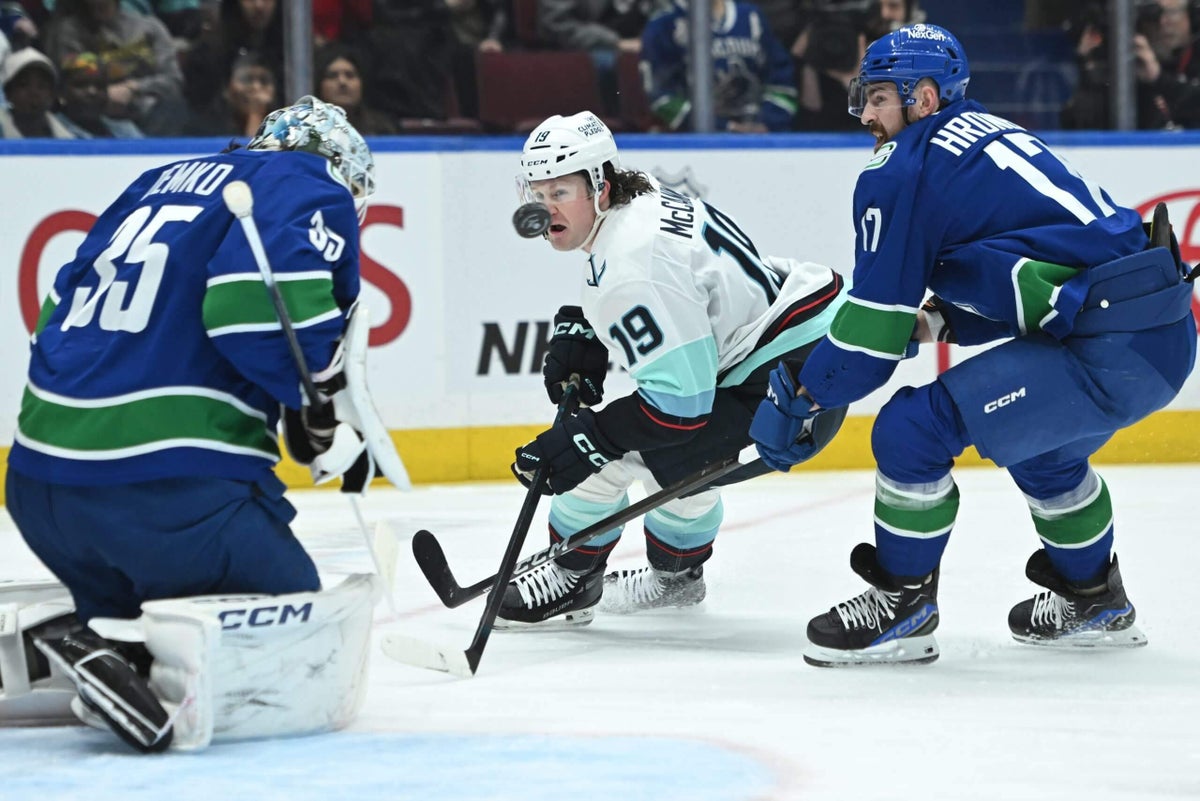

In one of the most dispiriting losses at the end of this disappointing campaign, the Vancouver Canucks got their hides handed to them by a potent symbol of the sort of short-term thinking that led them here.
Jared McCann is just 28 now. The second draft pick of the Jim Benning era, selected with the pick that Vancouver acquired when they dealt Ryan Kesler to the Anaheim Ducks, McCann was dealt after just one season — in which his development was rushed and spoiled through misuse, a lack of communication and an organizational inability to support a wildly talented but still immature teenage player — with the club.
Advertisement
Not only was McCann dealt for depth defender Erik Gudbranson on that fateful late day in May 2016, but Vancouver also attached multiple draft picks to the then 19-year-old sniper in order to consummate the deal.
It was a trade that, more than anything, captured in the starkest terms a deep-seeded organizational desperation to skip through the hard work and necessary pain of patiently accumulating talent.
In nine seasons since the Canucks dealt McCann, the Seattle Kraken left wing has scored 171 goals and amassed 374 points across stints with the Florida Panthers, Pittsburgh Penguins — where he was acquired by now-Canucks president of hockey operations Jim Rutherford — and the Kraken. That might not be a Hall of Fame level of production, but consider this: Over the same time frame, the Canucks franchise has rostered only three players who have scored more goals (Brock Boeser, Bo Horvat and Elias Pettersson) and only four who have recorded more total points (Boeser, Pettersson, Quinn Hughes and J.T. Miller) for the franchise.
On Wednesday night in Vancouver, playing for a Kraken team that’s already been eliminated from the playoffs, McCann ate Vancouver’s lunch. He picked up three points and played a significant role on a Kraken penalty kill that foiled Vancouver’s opportunities to grab an early lead (or get back into the game).
After picking up assists by leading a pair of Kraken breakouts in the second period, McCann iced the game in the third period with a wonderful setup to Andre Burakovsky off of the rush.
The Canucks, down 3-0 and effectively playing for their playoff lives, were pressing to begin the final period. McCann, however, skated off in the opposite direction, drew three Canucks checkers to him as Shane Wright and Burakovsky burst down the wings, and fed Burakovsky with a perfect setup that iced the game.
Advertisement
It was the sort of decisive, skilled play that this Canucks team needed more of this season, and it all but ended Vancouver’s hopes for a miracle playoff push in what little time remains in their season.
Vancouver doesn’t find itself in this situation, necessarily, as a result of the short-term thinking that led to the original McCann deal. Or the Loui Eriksson contract. Or the Jay Beagle and Antoine Roussel signings. Or the trade for Oliver Ekman-Larsson.
The Canucks’ current hockey operations leadership group is far savvier and far more disciplined than what they replaced. Truthfully, however, the club Rutherford and general manager Patrik Allvin inherited was devoid of prospects, cap flexibility and talent. That they were able to turn it around, mine some genuine prospect talent in the draft and unwind the club’s cataclysmic cap mess is the result of steady, high-quality work.
For all of the hits in the unrestricted free-agent bargain bin, the solid early returns from their work at the draft table and a series of sharp trades, however, the Canucks find themselves in this familiar, purgatorial place yet again: outside of the playoffs but well outside realistic range to select top five at the NHL Draft.
They find themselves here despite the incredible performances and sacrifices we’ve witnessed from Hughes over the course of this season.
Hughes has become one of the most impactful individual skaters in hockey, a rare player capable of both bending space and time to his will on a seemingly every-shift basis, while also producing offence like a star forward and shouldering workhorse minutes on the back end. If you were to build a list of NHL players more valuable to their teams, it would be a very short list indeed.
Vancouver, however, has asked too much of Hughes. His limits have been tested, especially in the wake of a multitude of injuries he’s played through this season, and, arguably of late, those limits have been hit.
Advertisement
That the Canucks were outcompeted and so soundly beaten 5-0 Wednesday night is all the more difficult to take given how Hughes performed. Even if it wasn’t a game played with quite the level of control and electricity that Hughes managed routinely earlier in the season, he still logged over 27 minutes, constantly danced through multiple Kraken checkers and set up a variety of dangerous scoring chances.
And he did it while visibly playing through injury. You can quite literally see him grimacing and uncomfortable on some shifts. On the bench, when he takes his short breathers, he often stands to stretch.
Hughes, however, won’t make excuses. Asked on Tuesday by the media about his health status, he just said he’s 100 percent.
Asked about the mental fatigue of chasing a playoff spot at this juncture in the campaign, Hughes instead drew a sharp a contrast with the performance of his club and the red-hot St. Louis Blues, who have left Vancouver in their dust.
Quinn Hughes on the pressure of playing must win games down the stretch: If you ask the St. Louis Blues if they’re tired of playing Game 7s every other night and trying to win, they’ve won 10 in a row. They’re not using that as an excuse. #Canucks @Sportsnet650
— Brendan Batchelor (@BatchHockey) April 3, 2025
For Hughes to have ascended to this level as an individual skater and as a leader, and for the team to have fallen this far short of a playoff spot despite his efforts, is nothing short of incredible.
It’s a testament, really, to the shaky foundation on which Rutherford and Allvin attempted to construct a contending roster. A team built around a core that proved unable to partner effectively with one another, leading to the Miller trade in January. A team that ultimately proved unable to overcome a difficult run of injuries, the regression of key individual performers like Pettersson, and maintain a consistent competitive edge.
There are plenty of reasons to believe that this season, a campaign in which anything that could’ve gone wrong seemingly did, isn’t a reflection of this team’s true talent level. That this team is better than the record indicates and should reasonably be expected to bounce back next season.
Some of those reasons are compelling, and the fact the Canucks have Hughes is the most compelling reason of all.
And yet Vancouver’s path to being a perennial playoff team — and hopefully a contender — isn’t going to get any easier. Vancouver will deal with the ghost of impatient moves past yet again this summer, their purchasing power in unrestricted free agency hamstrung by dead money cap hits as a result of the Ekman-Larsson buyout and the mild retention of Ilya Mikheyev’s contract. The Canucks’ cap mess has been commendably unwound, but Vancouver will still rank among the bottom 10 NHL teams in real cap flexibility this summer.
Advertisement
Meanwhile, this Blues run isn’t being driven by a host of aging veteran players like Brayden Schenn and Colton Parayko. No, it’s younger veteran players like Dylan Holloway, Zachary Bolduc, Robert Thomas and Philip Broberg who are spurring on this late season renaissance in St. Louis.
The Canucks are only one point clear of the Utah Hockey Club, who are loaded with elite young players still finding their way in this league — including Dylan Guenther, the player selected with the pick Vancouver used to acquire Ekman-Larsson.
Even the Anaheim Ducks, who will visit Vancouver this weekend, are set to improve by 20 points year over year and are squarely in the rearview mirror for Vancouver going forward. And the Calgary Flames, who arguably overachieved this year, have reams of young talent — like Dustin Wolf, Matthew Coronato and Connor Zary — contributing in a significant way on their roster this season, and more high-end talent coming as a result of 2024 NHL Draft class that is tracking in very promising fashion.
All of that, of course, doesn’t even consider seven of the Western Conference teams that will qualify for the Stanley Cup playoffs this spring.
The real risk, after all, of never being willing to take a step back and accumulate elite talent, isn’t just that you never amass enough to rocket to the top of the standings and earn a real shot at winning the Stanley Cup. It’s that even if you find transcendent talent, a once-in-a-lifetime blueliner of Hughes’ quality, you may get caught from behind by teams that have put in the work to have even more.
Leaving aside some of the biggest offseason questions — Rick Tocchet’s long-term future or Hughes being just 15 months away from becoming extension-eligible — that’s the challenge Rutherford and Allvin will face this summer. Get this team back on track and graft multiple high-end forwards onto this roster despite holding insufficient assets and cap space weaponry for the task at hand.
It’s not impossible, but it’s going to be a tall order — taller still because of the club’s characteristic refusal to defer gratification at the trade deadline.
Advertisement
Vancouver decided to hold onto pending unrestricted free agents like Boeser and Pius Suter last month, frittering away another opportunity to prioritize the long term at the expense of the present. The result? Four regulation wins in 14 games since March 7, and a team whose fate has been effectively sealed with seven games remaining.
(Photo of Jared McCann shooting against Thatcher Demko: Simon Fearn / Imagn Images)
This news was originally published on this post .





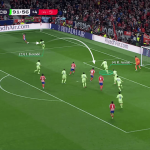
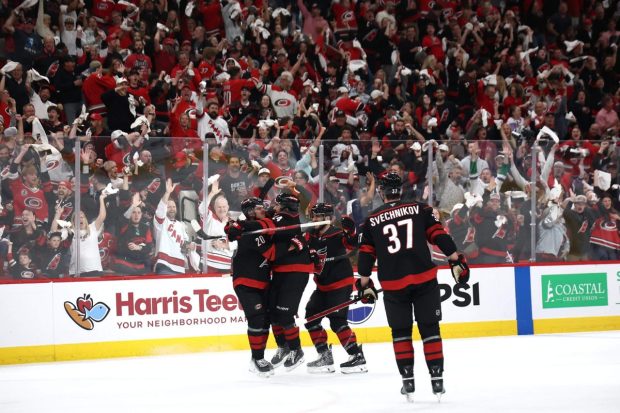
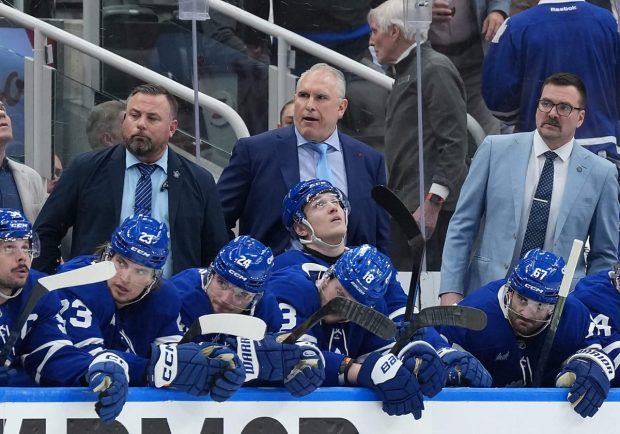
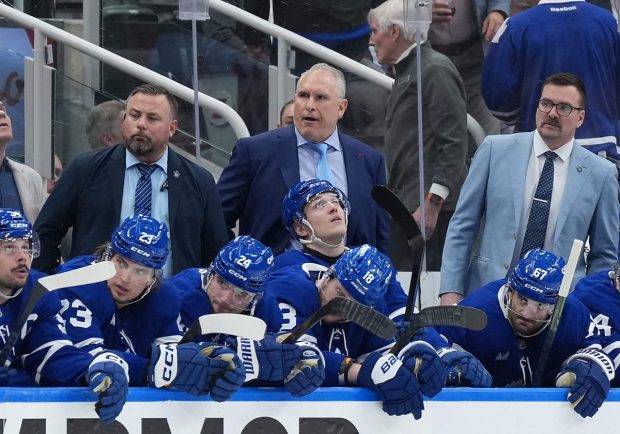
Be the first to leave a comment